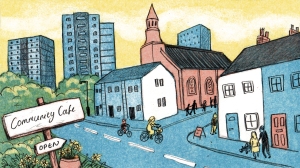Christian responses to poverty: community not charity
 At the start of November 2018, Church Action on Poverty and our partners at ‘Life on the Breadline’ held a National Poverty Consultation in Manchester, drawing together many people in the churches who are involved in tackling poverty and injustice. At an opening panel on ‘Church of the Poor’, campaigner Stef Benstead shared these thoughts on Christian responses to poverty.
At the start of November 2018, Church Action on Poverty and our partners at ‘Life on the Breadline’ held a National Poverty Consultation in Manchester, drawing together many people in the churches who are involved in tackling poverty and injustice. At an opening panel on ‘Church of the Poor’, campaigner Stef Benstead shared these thoughts on Christian responses to poverty.
Eight years of government cutbacks have caused a return of destitution in the UK. Increasing numbers of people are unable to afford housing, food, hygiene products, electricity and heating. In response, food banks have become a major institution, but government cuts to charitable grants mean that the rest of the charitable sector is falling under the weight of need.
Many Christians rightly want to respond. But others say that their responsibility ends with the paying of their taxes. Some complain that the welfare state has destroyed community and so they want the State to pull back and reduce taxes.
But the State has pulled back and has cut taxes, without a commensurate rise in Christian giving.
How should Christians respond to austerity? Should we be calling on Christians to step up and take direct responsibility for community and the ending of poverty? Is there any role for the State in ending poverty, and if there is do Christians play any part in achieving State action?
In God’s plans for Israel, he made provision for both charity and dignity. The laws on redemption saw land, possessions and wealth restored to poor people as of right; the laws on gleaning and servitude meant that there was always decent work available to poor people, again as of right. These laws – to be created and maintained by the State – ensured dignity for all people. The State bears a God-given responsibility for basic rights and dignity of people under its rule. Direct charity by individuals does not let the State off the hook, because charity does not provide the basic dignity that God expects for all people.
But State provision does not let individuals off the hook for direct charity either. God still required his people as individuals to give generously to those in need.
The reason for this, I think, is two-fold. Firstly, the State can provide access to all that people need, but the people who most need it will tend to go unseen by the State, because they are not accessing State support. There will always be a need for Christians to deliberately seek those who otherwise go unseen. Even better would be for Christians to already be there, to already be friends before a crisis comes.
Secondly, we are social animals. We have needs that go beyond the physical and material. The State can’t provide this, because true friendships are based on two people choosing to spend time together. The need for free choice makes it impossible for any State structure to provide true companionship. Even the charities that provide befriending services don’t fully replicate friendship.
Christians as individuals must be doing what Jesus did: leaving their wealth and privilege to live amongst the poor and needy, to be there when help is needed, to be charitable by being community. And Christians as a body should be working to see good government: government that provides access to decent houses and decent jobs, so that everyone has the opportunity to provide for themselves as far as they can rather than being dependent on the chance good-will and whims of the better-off.
Stef Benstead is a disability and social security researcher. Her new book Second Class Citizens is coming soon.
